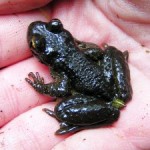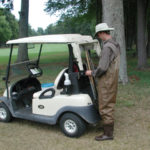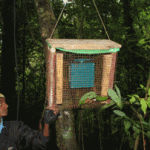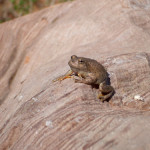Last week’s discovery of a new frog species in New York City was one of our favorite recent amphibian news stories. The story was picked up by newspapers both across the country and worldwide, from the BBC to the News Pakistan. We especially liked the story, not only because we are both native New Yorkers, born within an hour’s drive of where this frog was discovered, but also because it was discovered by a scientist from New Jersey (our adopted state.)
So here’s the story, as reported by the New York Times and New Jersey Newsroom.com:
While doing research in Staten Island (one of New York City’s boroughs) in 2009, Jeremy A. Feinberg, a doctoral candidate in ecology and evolution at Rutgers University, heard an unusual frog call. Instead of the “long snore” or “rapid chuckle” he would normally expect from a leopard frog, he heard instead a short, repetitive croak. Feinberg suspected this frog might be a new species. He teamed up with Cathy Newman, a geneticist completing a master’s degree in genetics at the University of Alabama, to test the frog’s DNA.
Newman compared this frog’s DNA with the DNA of southern and northern leopard frogs, which range widely north and south of New York City. These frogs look quite similar to each other, but the results indicated that this frog’s lineage was genetically distinct.
Feinberg believes this leopard frog once inhabited Manhattan and the other boroughs. He has found specimens in the Meadowlands and the Great Swamp National Wildlife Refuge in New Jersey, as well as in Putnam and Orange Counties in New York. Some frogs were also collected in central Connecticut.
What’s unusual about this finding is that new frog species are usually found in the remote rainforests of Indonesia and similar places, and not within the shadow of one of the world’s most densely populated urban areas.
The New York Times has asked readers to come up with a name for this new frog. They have listed some attributes of this frog to give you inspiration for a name, including the fact that the geographic center of the frog’s range is Yankee Stadium in the Bronx.
How about The Green Bomber? After all, there are Yankee fans all over the tri-state area.
More information about the discovery:
The findings are to be published in an issue of the journal Molecular Phylogenetics and Evolution, but are currently available online. Much of the genetic analysis was performed in Professor H. Bradley Shaffer’s laboratory at the University of California at Davis, where he worked until recently.
Photo of Jeremy Feinberg, courtesy of New Jersey Newsroom.com






